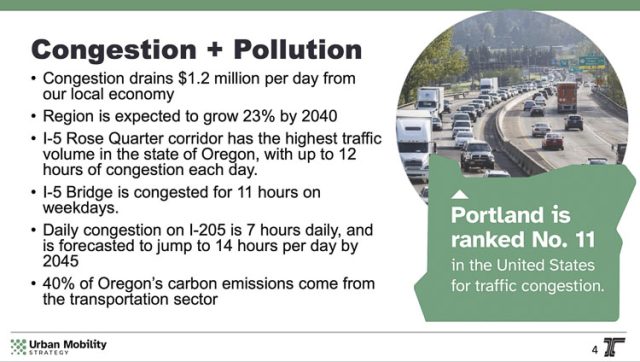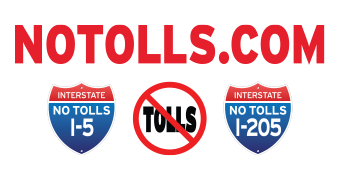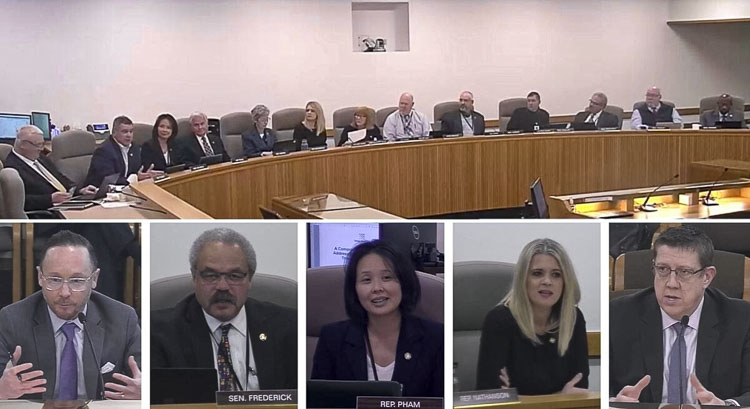January 17th meeting of Joint Committee on Transportation.L to R: ODOT Urban Mobility Office Director Brendan Finn, Sen. Lew Frederick, Rep. Khanh Pham, Rep. Boshart-Davis, ODOT Director Kris Strickler.
Spicy exchanges with lawmakers portend challenges for ODOT toll program
I used to think the I-5 freeway expansion projects at the Rose Quarter and the Interstate Bridge were the toughest things the Oregon Department of Transportation could ever try to pull off; but that was before I fully understood the massive headwinds they face on tolling. For ODOT, starting up a toll program will make trying to widen a freeway in Portland’s central city seem like a walk in the park.
“Why didn’t you look at public transit investments for congestion relief?”
– Khanh Pham, Oregon House

Tolling is full of thorns matter how you try to hold it. Many people fear diverted traffic will exacerbate already dangerous and clogged surface streets, some are concerned a lack of options to driving will create captives to the fees, others don’t trust ODOT’s motives or their planned uses of the revenue, and some people simply just don’t like the idea of being charged more to drive. Behind each one of these serious detractions are upstart activist groups ready to pounce.
With the start of the 2023 legislative session last week, ODOT leaders now have another powerful slate of skeptics and scrutinizers: Oregon lawmakers. ODOT is facing hard questions and skepticism about tolls from both sides of the political aisle.
At the first two meetings of the Joint Committee on Transportation in the Oregon legislature last week we learned how key lawmakers feel and how high the stakes are for a program that hopes to begin charging tolls for driving trips for the first time ever by the end of next year.
At their first meeting of the session on Tuesday, January 17th, the committee heard a presentation on ODOT’s toll program. As ODOT Urban Mobility Office Director Brendan Finn went through his slides, State Rep Khanh Pham asked him to stop on the one labeled, “Congestion + Pollution.”

“I assume the assumption behind this is that tolling will help fund the freeway expansions which will reduce the congestion,” Rep. Pham said. “I’m thinking about what we could do to get people out of their cars by investing in public transit along those corridors. And what a billion dollars could do for that. Why didn’t you look at public transit investments for congestion relief?”
Finn replied that in addition to freeway expansion funding, the legislature set aside money for transit in the landmark House Bill 2017 package passed in 2017. He didn’t mention any dollar amounts, but that funding is based on a state payroll tax that has generated about $60 million per year for transit improvements statewide — a drop in the bucket compared to what the state spends on highway projects.
Then Co-Chair Rep. Susan McClain, one of the main supporters of HB 2017, interjected to back up ODOT. She added that the bill was “multimodal” because it “did something” for transit, Safe Routes to School, and so on. She’s right. It did “something.” But this framing overlooks the huge imbalance of spending and belies the fact that it was a “highway bill” with its vast majority spent on freeway and highway projects.
Senator Lew Frederick, who represents north Portland neighborhoods bisected by I-5, said his chief worry is diversion of freeway traffic onto streets like Sandy, Martin Luther King Jr. Blvd, and Broadway. “The concern is that the city is going to be asked to upgrade [those streets] without any additional resources… Where are you in terms of talking with folks about how that diversion strategy will be paid for?” he asked.
“I’ll be very kind to you on this — ODOT has not necessarily got the greatest amount of trust.”
– Lew Frederick, Oregon Senate
When Brendan Finn from the Urban Mobility Office said ODOT is working to model these impacts with the City of Portland and that the state will ultimately pay for those mitigation projects, Sen. Frederick replied, “I appreciate that. But I’ve got to tell you some of the people that I’ve heard concerned about it are the folks in those very cities and city governments who are saying, ‘We don’t know what’s going on with this exactly. We’ve been given vague assurances.’”
“And they,” Frederick continued. “And I’ll be very kind to you on this — ODOT has not necessarily got the greatest amount of trust and the idea that you’re going to do something about it, and that [cities] will be involved is not necessarily enough. I think you need to be much more direct and specific about how you’re handling this situation.”
(Later in the meeting Sen. Brian Boquist underscored in stark terms the public perception problem ODOT faces: “You’ve got a communications problem you’ve got to fix. It’s just that simple. You’ve got to fix it if you want to go forward.”)
At that point Director Strickler jumped in. Strickler has already begun to manage expectations and set his own narrative about diversion and who will be responsible for it.
“It’s important that we identify what the true impact of the toll is,” he said at one point in the meeting. “As opposed to just kind of a desired wish list associated with all the other things that we have to do in an area.” He told Sen. Frederick that we have diversion from traffic on the freeway now and it’s difficult to understand what exactly causes it. Regardless of its source, Strickler assured the senator that the NEPA process for the toll program will force ODOT to pay for any negative impacts tolling is expected to have on surrounding streets.
Strickler also said that ODOT doesn’t know what the diversion impacts might be because they haven’t completed an analysis of it yet. “I’ll be honest with you, we don’t have firm answers to say, ‘These 12 intersections will be mitigated,’ because we’re still trying to evaluate the impacts of each of those. But as we go through that process, I am asking for a little bit of a trust.”
“As we go through that process, I am asking for a little bit of a trust.”
– Kris Strickler, ODOT
(This “It’s still too early, just trust us,” stance from ODOT sounds similar to the one they gave elected officials on Metro Council in 2020 in order to secure their support for $129 million in funding for the I-5 Rose Quarter project.)
Sen. Frederick still seemed unsatisfied. “Here’s the issue,” he said, sharply. “You don’t let people know soon enough. You don’t let people know often enough… in order to try to at least begin to break through that trust issue because people make up their own myths if they if they’re not given enough information.”
House Rep Khanh Pham added to Frederick’s points by asking ODOT for a specific estimate of total revenues each city will receive to mitigate toll program impacts to low-income households, public transit providers, and local governments to pay for street upgrades.
ODOT Director Strickler told Rep. Pham, “That’s actually not the way that the process is working… We don’t have those numbers yet.” Strickler said the FHWA (via the NEPA process) will tell ODOT what (if any) the negative impacts are and then they will be directed to fund mitigation of those impacts. But he also warned that all tolling revenue will be part of the State Highway Fund so it will come with strings attached (as in, it cannot be used to fund transit or other “non-highway” projects as per Oregon’s constitution).
“You’re also saying there’s restrictions to what you can do, so some of [those mitigations] would be unfunded…”
Unfortunately this exchange between Director Strickler and Rep. Pham was cut short because Rep. McLain interjected for a second time. “Okay, so this is a really important area. And it again, is is not done, the conversation is continuing on,” she said.
After getting grilled from Democrats Frederick and Pham, next up was Republic Rep. Shelly Boshart Davis. She thinks tolls are social engineering. “I hear a lot about changing behavior and getting people out of cars. You say we’re giving people options, I hear we’re taking away choices,” she said. “I think that is cause for concern. I think that that needs to be recognized that we’re making choices for other people… my constituents hate it when the state tells them what to do,” Boshart-Davis continued, perhaps not realizing that the current system that allows driving to remain so cheap and convenient also takes away choices of many people.
Keep in mind, all of this happened at just the first Joint Transportation Committee meeting of the session! And just two days later, ODOT was grilled again about their toll plans and how they will impact low-income Oregonians.
It’s going to be a very bumpy ride for ODOT. Wait until you learn how leveraged they are because of project cost increases and their desperate need for funding several freeway megaprojects they are determined to get done no matter the cost. Stay tuned!


